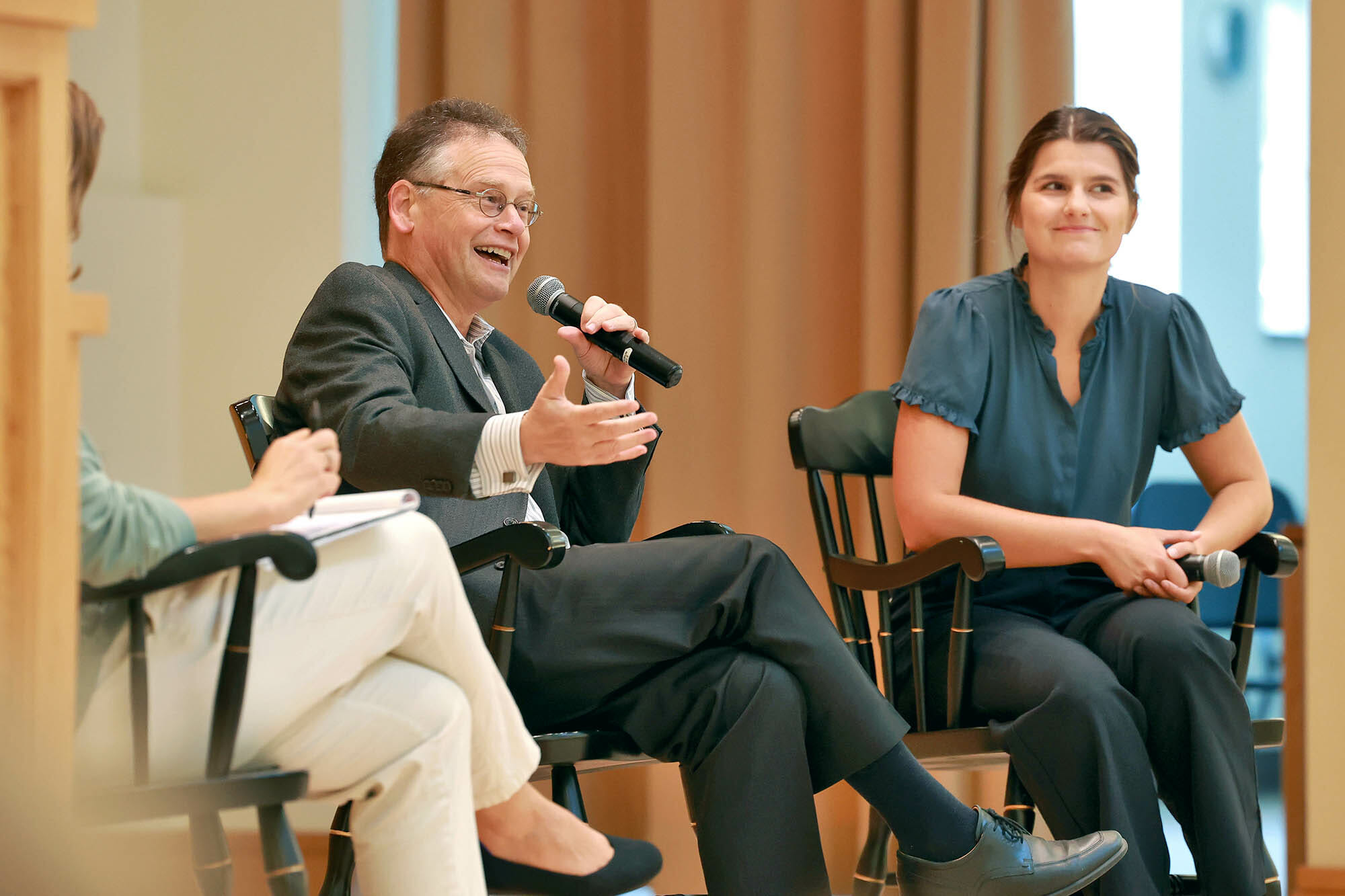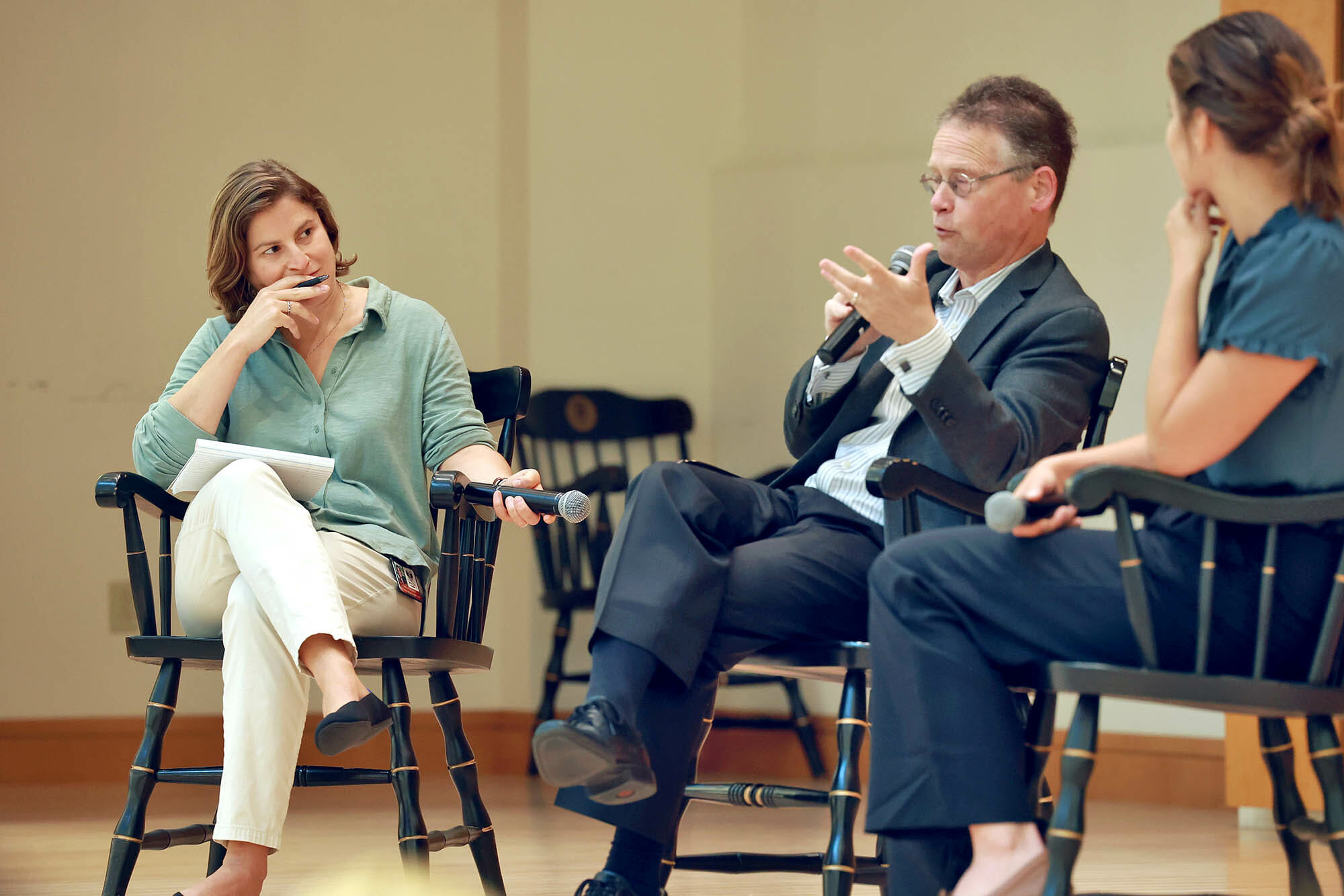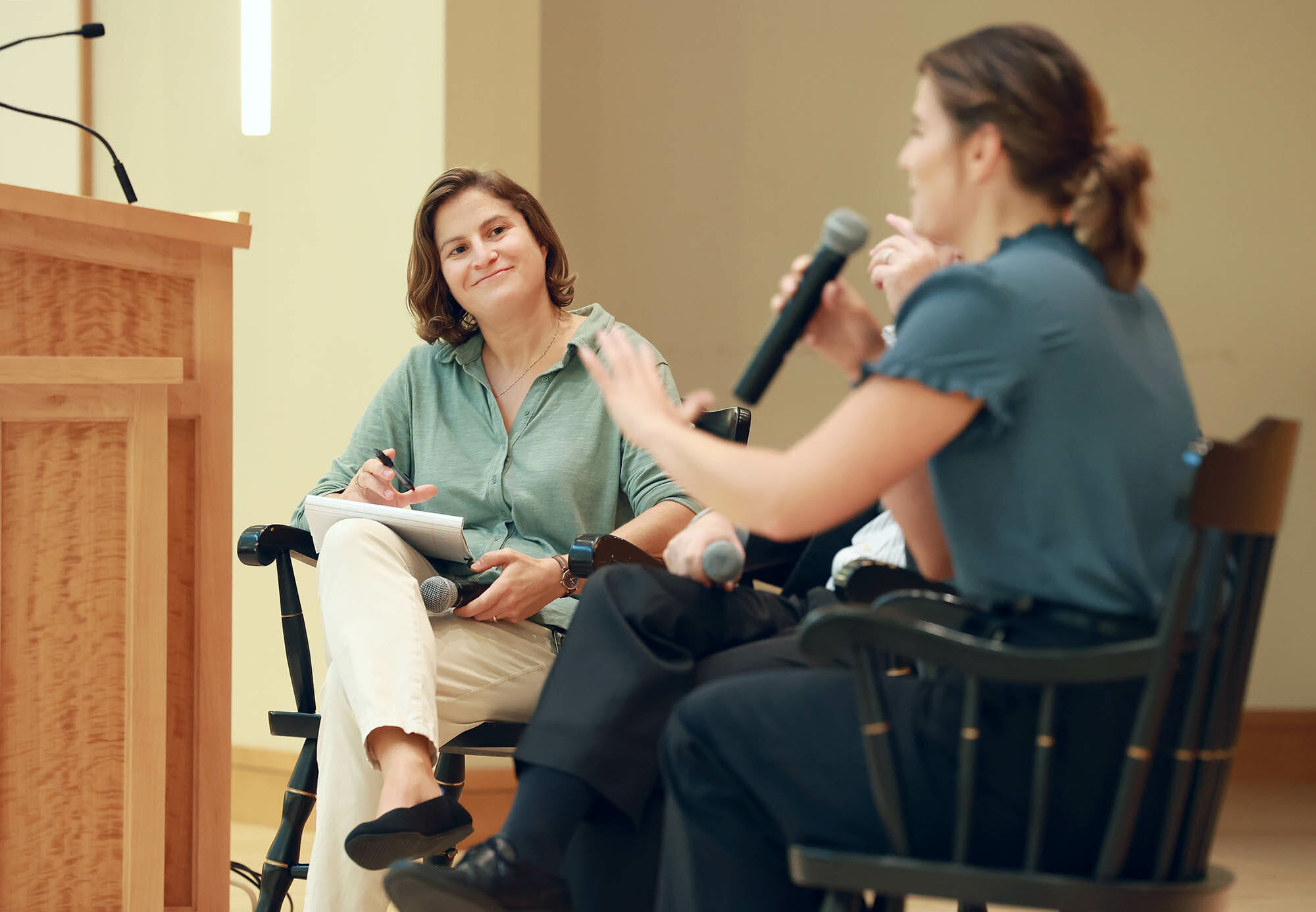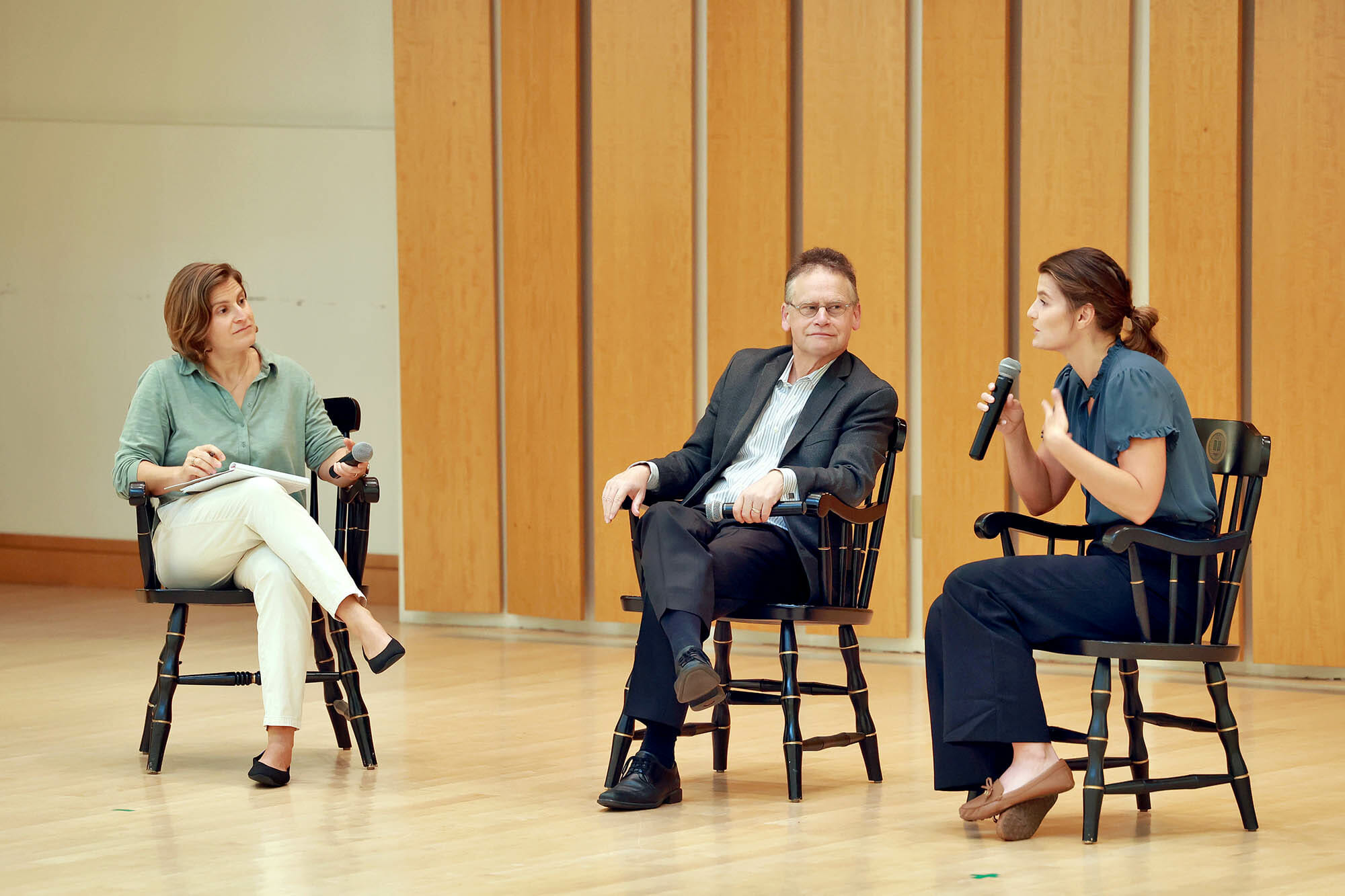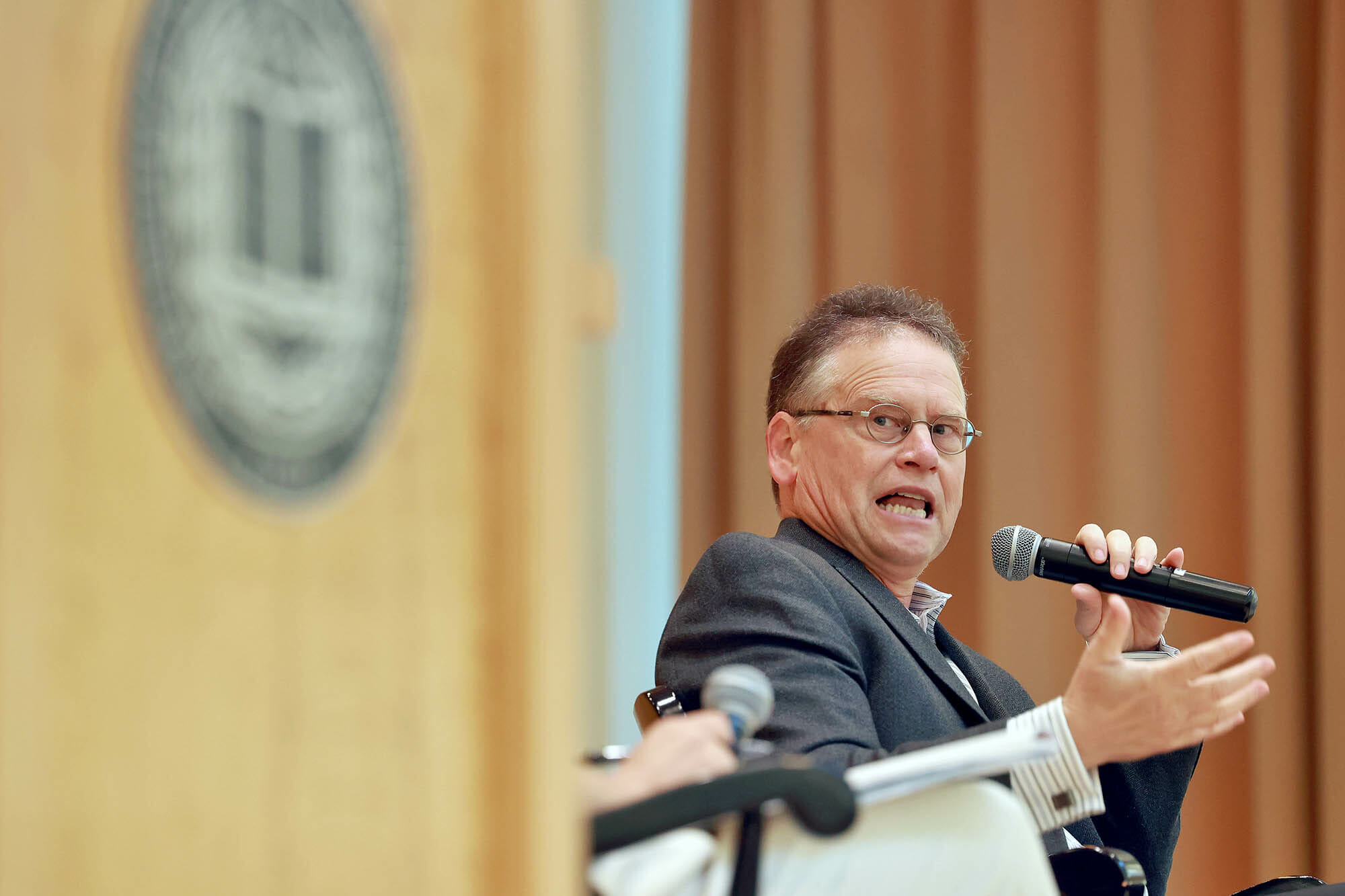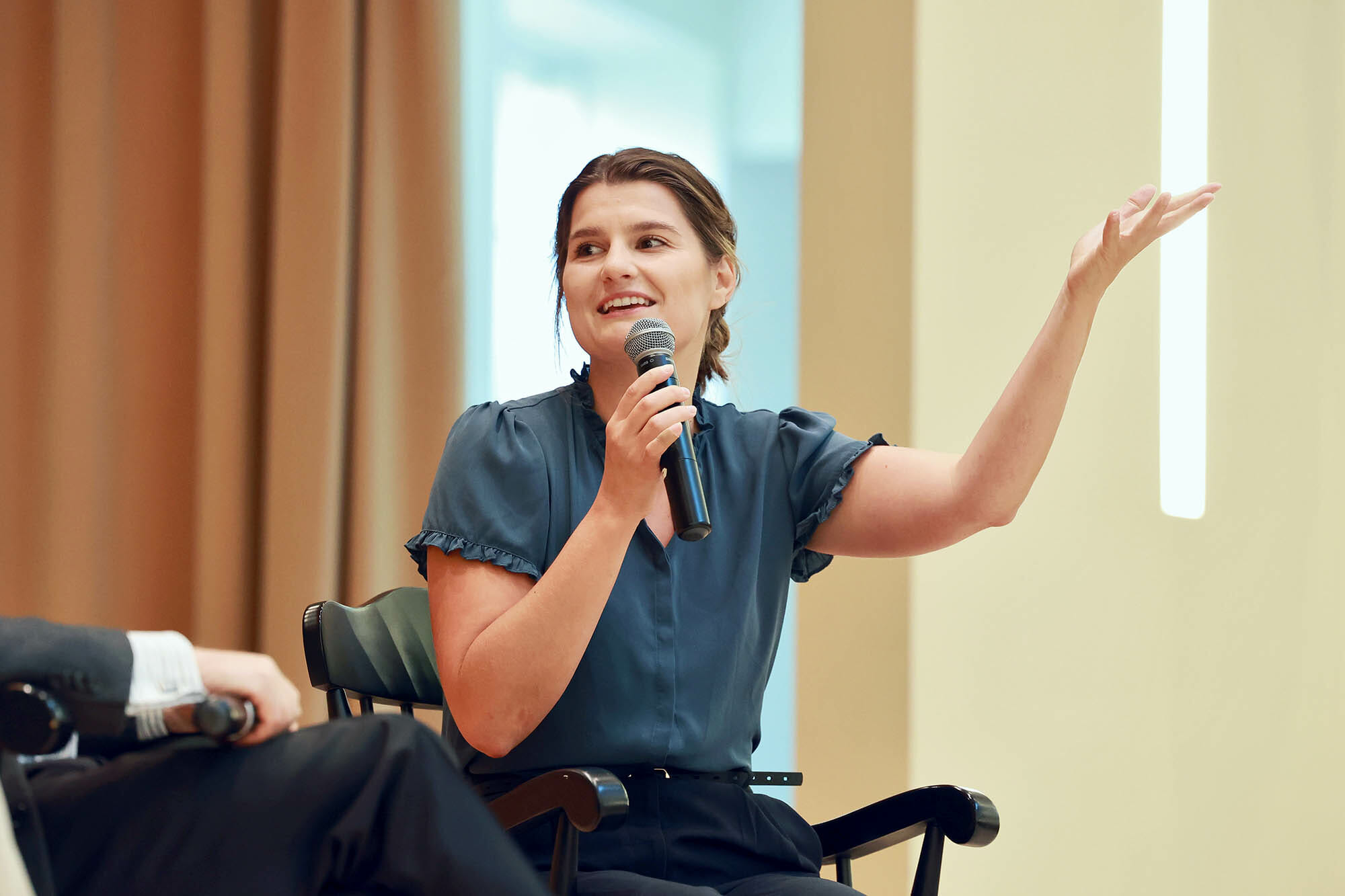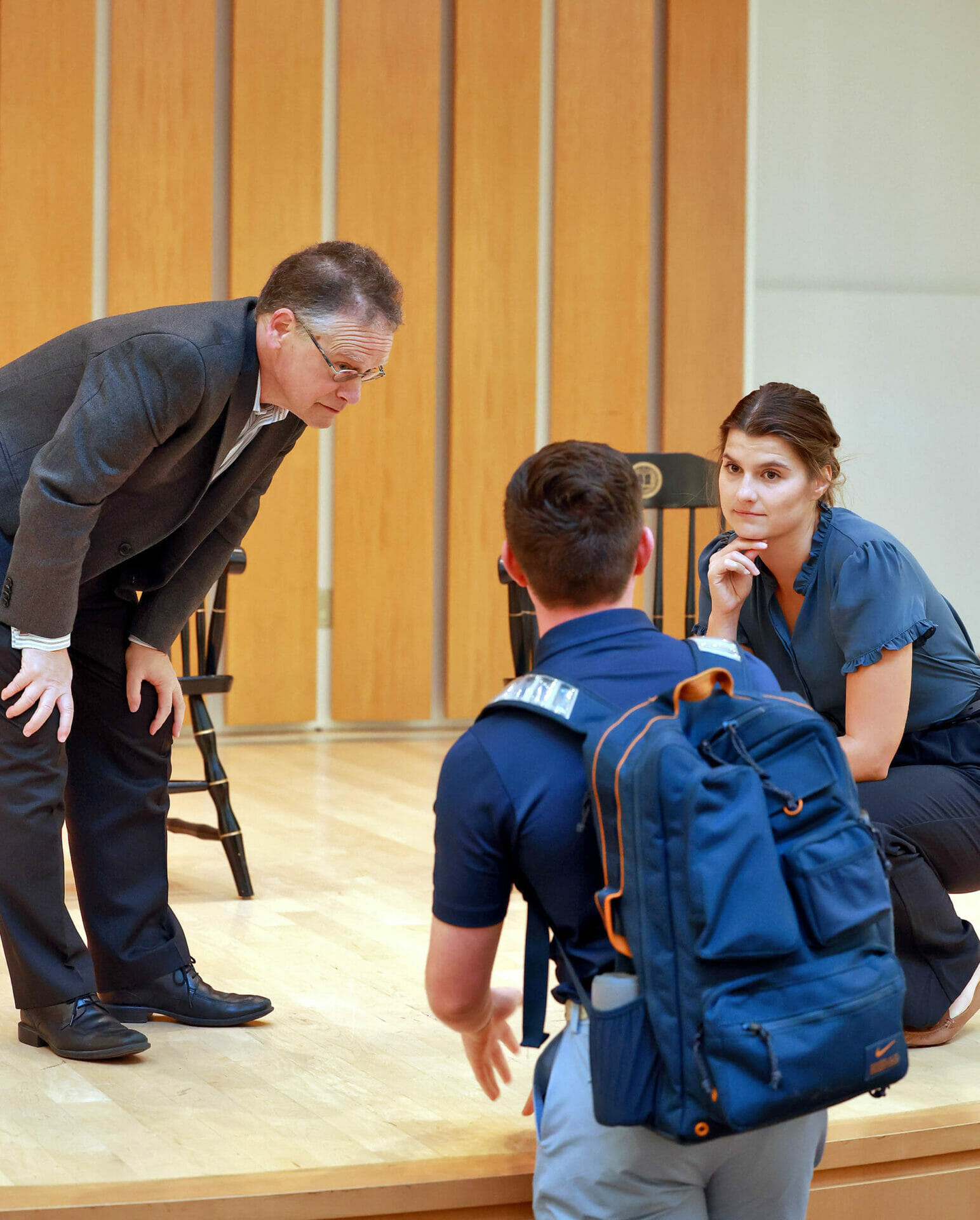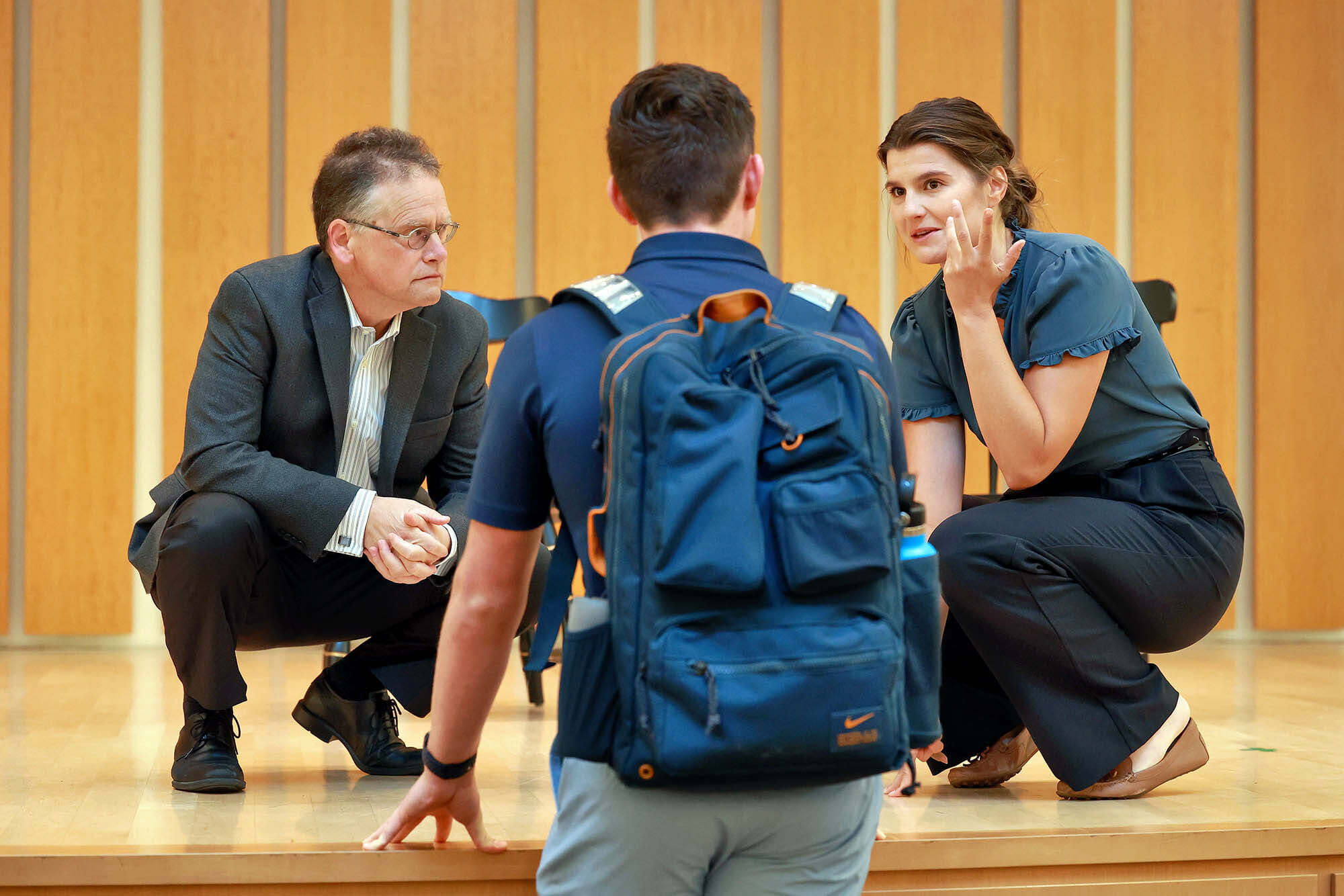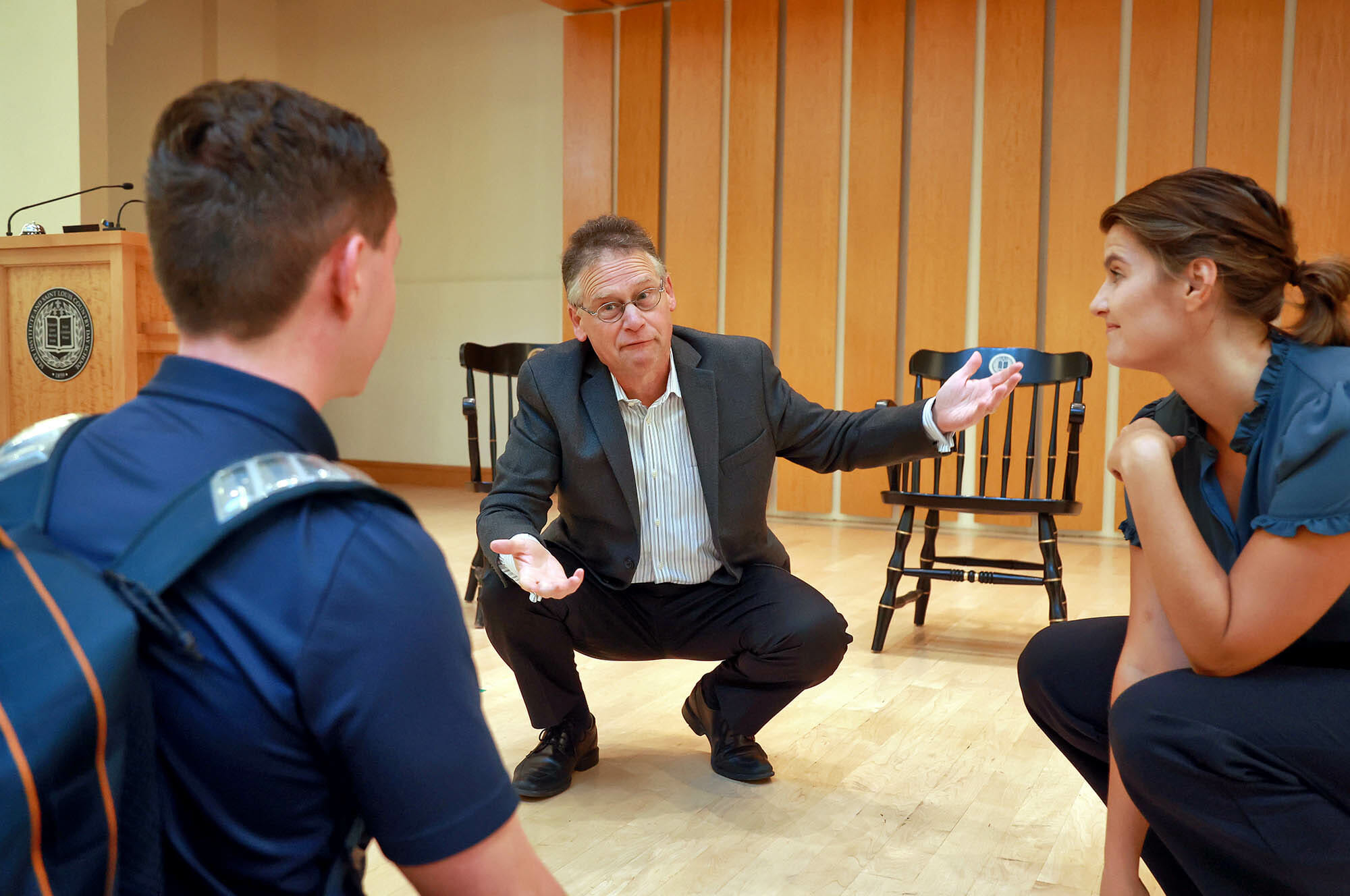Carla Federman, JK-12 History and Social Sciences Department Chair, moderated a panel with two experts: Jorge Riopedre P’20, Executive Director of Delmar DevINe, and Susie Bonwich, Development Associate at New+Found, a real estate development company focused on positively impacting the local community (The Foundry is perhaps its best-known project).
Federman began the panel by asking our two guests to share their backgrounds and how they came to be in their current roles.
Bonwich, a native St. Louisan, has a background in restaurant corporate training, working at Five Guys as “boots on the ground” for operations before earning an MBA at Washington University. At New+Found, she has the opportunity to focus on the overlooked and undervalued to find and create spaces that promote community. “I’ve been there three years, and it has been amazing to see things that are rundown turn into a place for people to come together.”
Riopedre came to St. Louis 32 years ago from Tampa, working in television and radio and starting two businesses. He eventually became the head of the Hispanic Chamber of Commerce and delved into social service, including healthcare for immigrants. Build-A-Bear Founder Maxine Clarke started Delmar DivINe “as an attempt to change the trajectory of North City, which is extremely important in its own right. But when you’re talking about business and investing, if you’re not investing in a quarter of your land mass, you’re not going to be successful,” he said.
What do your days look like?
“My job is never the same from one day to another,” explained Riopedre. “We’re supporting 33 non-profit organizations, trying to empower them to be the best they can to serve a quarter million people. We’re working on community engagement, helping residents of North City activate themselves and their communities. We are working in conjunction with the residents, so we aren’t imposing programming on them, but finding what’s going to be helpful. There’s planning and programming, strategic planning, and fundraising.
Bonwich’s job changes by the day, too. “I could be at the food hall onboarding a new tenant, or in a meeting figuring out the next big project. New & Found partners with an architecture group and a construction group so there are always meetings. And like Delmar DinINe, we have to find the money and decide where it goes and where it’s invested. Money is expensive right now. You want to make sure the projects you’re choosing have a return worth that expense. We can’t just stop investing in the city, so we’re getting creative with raising money.” While there is funding out there, donors are interested in investing in specific areas, so there’s a sense of matchmaking happening with all the stakeholders.
What makes you optimistic? What makes St. Louis a good place for investment, a positive place for business where change can happen?
Bonwich describes traveling all over the country, visiting different cities at her former job. “St. Louis has a vibe,” she said, “and a support system.” She shared that before The Foundry opened, a lot of people were hesitant to go into the city. That changed quickly.”We opened the doors and were bursting at the seams with support. St. Louis wants to see businesses succeed.” She noted that the impression that St. Louis is dangerous and not a good place to live is misguided. “Time Magazine named St. Louis one of the greatest places to live in 2020, along with Helsinki and Barcelona,” she said.
Riopedre referenced the low cost of living in St. Louis, in addition to the cultural institutions that are free, including many museums and the zoo. “The ability for people to experience culture and cultural touchstones at low to no cost is important,” he said. “The business community is really invested in St. Louis. Cortex and BioSTL are doing marvelous stuff with the Middle East on the biotech side, and we have a nonstop flight to Frankfurt, Germany now that is always full. There is a lot of investment going on under the radar that we don’t take enough credit for. The fact that there’s a lot to build on makes me smile.”
What is holding us back? What worries you?
Riopedre was direct: fragmentation. He referenced the multiple municipalities, fire districts, school districts, all of which keep the St. Louis region from acting in a unified fashion. “This is a major problem,” he said. “We have taken minimal steps to make that different. Transportation? We’re still a city that doesn’t have direct air service to most major cities. Metrolink goes only east-west, not north-south, being able to get people from where they live to their jobs.
Bonwich cited St. Louis’ bad reputation for crime. “People are fearful. Youth want to leave, but there’s so much opportunity and potential. Don’t ignore that St. Louis has a lot of potential, and you can be very successful here.”
How can we encourage young people to stay?
“Something that’s really encouraging downtown or midtown, is all the cranes, especially in the central corridor. They that St. Louis is developing. One of the projects I’m excited about is Great Rivers Greenway, and more pedestrian walkways around St. Louis. These are making it more of a walkable city, making it more urban. Doing visible projects like that make want to people stay and see it finished.”
“We have to do a better job changing some of our policies and attitudes,” said Riopedre, before addressing the students in the audience directly. “Your generation is better on issues of equity and race, which have been a significant problem for St. Louis. If you leave, then nothing changes. If you care about these things, stay and help make the change.”
Bonwich encouraged students to move within the city, to scratch the itch of wanting something new but staying where they can make a difference.
What about community partnerships? How do business and community connect?
“At The Foundry, one of our values is community,” said Bonwich. “We partner with several organizations that give small businesses the stage to show their passion. It’s fun to see people focus on a niche item of what they want to do.” She spoke about someone making candles at The Foundry, and the excitement around giving people a stage to celebrate what they do. It’s also important to host events centered around inclusivity, so New+Found partners with the Pride Foundation, Taste of Black St. Louis, schools, and more to offer events that showcase a wide variety of people.
Riopedre shared that Delmar DivINe was instrumental in reviving a hospital built in 1904 that had fallen into disrepair after years of neglect. It’s been renovated and is now a hub for non-profits and community service. “This would not have happened without partnerships across the board,” he said. “We worked with six other agencies to launch a program for community wellness. Every time I talk to other nonprofit organizations about what the future holds, and what the sector is looking at, it comes back to the same thing: you must have partnerships and collaboration. Problems are not solvable by one or two organizations. We try to see who are our viable partners to work with so we can get farther than we would by ourselves.”
Business and business goals: what is driving you? What is the motivating factor, and what are the goals?
“The goals of our organization are looking for the overlooked and undervalued, going for the opportunities that other people might think ‘That’s not worth the investment,’ especially since money is so expensive,” said Bonwich. “It’s a risky market, but we’re looking for things that are true opportunities hidden under the dust. Every decision we make, we consider what other impact it can make instead of just money. What’s the multiplier? Who else is impacted or affected? We are not just building buildings but creating jobs, livable jobs.”
Riopedre agreed. “It all comes down to people. You can be an entrepreneur and investor, but if you don’t have good employees and a public that can receive and purchase, you don’t have anything. How are we helping people? How are we stabilizing communities? Empowering and connecting people is the first step if you’re going to have a viable economic floor. The straight line from the empowerment of people and the stabilization of neighborhoods to have a vibrant business community.”
The History of St. Louis students recently surveyed their parents, asking for three words to describe the metropolitan area. Just like the politics panel last week, Federman asked the panelists for their three words, and the auditorium fell silent as they contemplated their answers.
- Riopedre: full of possibility
- Bonwich: friendly, innovative, tasty
A variety of great student questions led to more information from our panelists:
Bonwich: “You’re going to start seeing definite changes in five to 10 years, on the city’s current trajectory, due to current investment. We’re already seeing improvements in terms of walkability. Maybe 15 to 20 years in terms of urbanness. One opportunity would be to expand Metrolink.”
Riopedre: “We’ve been the vanguard of new construction and development. In part because of us, we have seen a lot more starting in North City, north of Delmar Boulevard. Construction feeds on itself—the first domino falls, and the second, third, and fourth are easier.
Bonwich: “We have great relationships with banks. It’s a borrowing market for us, but with the way the economy is going, we have to get creative. It’s all about relationships; it goes back to people: if they trust you, they’ll trust your ideas. A lot are people born and raised in St. Louis and want to see it thrive.”
Riopedre: “Great relationships are everything. It helps to be good at what you do, but relationships trump everything. People want to do business with people they like. We raised $8 million for Delmar DevINe, and a lot was due to 10-15 years of relationship building. It’s showing people what your vision is, that you have the capability, and then making good on that. You’re not going to build anything of consequence yourself, you’re going to build with other people.”
Thank you to both of our panelists for a fascinating discussion!
